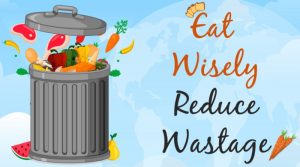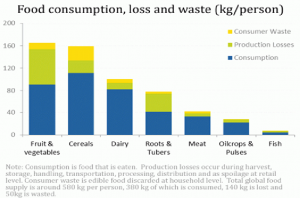
Managing Food Processing Industry Waste
A very large quantity of both liquid and solid waste are generated yearly by the food processing industry. The waste materials contain biodegradable organic matter and disposing of them can create serious environmental problems. Though the waste loads at the processing plant can be reduced through the usage of new processing methods, in-plant treatments, and re-use. There are a lot of waste treatment processes available to make the wastewater suitable for discharge. The key to minimizing the cost or disposal is to remove the extra moisture from the waste. There are numerous opportunities for better utilization of food processing waste. A lot of processes have been developed to convert the waste material into biofuels, food ingredients along with other valuable bio-products. The food processing industry across the globe is trying to make some serious efforts to minimize by-products, recycle processing and packaging materials, and save energy and water. The three R’s- Reduce, Reuse, and Recycle, of waste management can be helpful for food manufacturers in reducing the amount of waste sent to landfills and reusing waste.
Related projects:- LIST OF PROFITABLE FOOD PROCESSING BUSINESS IDEAS
Waste Management Options
- The global volume of food wastage is estimated at 1.6 billion tons of "primary product equivalents." Total food wastage for the edible part of this amounts to 1.3 billion tons. Food manufacturers suffer from a unique problem although most of the waste is organic in nature excess product generally has a short shelf life. A large amount of food is widely being wasted throughout the food supply chain starting from primary production, then distribution and sale, and lastly in the preparation and serving of food in commercial and domestic environments. Yearly, one-third of the food produced in the world for human consumption gets lost or wasted. The interesting fact is that in developing countries food is majorly being wasted at the consumption stage, and that means even after being suitable to eat it is still being thrown away. Here, consumer’s behavior plays a very important role, by raising awareness among people, households, and all the consumers in general.

Related Book:- The Complete Book on Managing Food Processing Industry Waste
- The waste food that is being created during the production can be turned into animal feed. The foodservice sector is one of the most significant areas of food waste. Besides all the actions the simplest one is the prevention of waste at the source such. A good example of this can be reducing the portion size at hotels, restaurants, and cafeterias; this will therefore will reduce the number of food wastes in this sector.
- Also, 1.4 billion hectares of land which is 28 % of the world's agricultural area, is used yearly to produce the food that is lost or wasted. Organic waste at any food processing plant should be composted in a modern in-vessel composting and the resultant fertilizer can be used for in-house landscaping or sold as organic fertilizer at attractive prices. Another way of managing organic waste is at the food manufacturing plant is to biologically degrade it in an anaerobic digester leading to the formation of energy-rich biogas and digestate.
- Items like cardboard, clean plastic, metal, and paper are all the supplies that can be sold to recyclers. A lot of cardboard boxes are used by food manufacturers for supplies that can be broken down into flat pieces and sold to recyclers. Cardboard boxes can be reused to temporarily store chip packages before putting them into retail distribution boxes.
Related Projects:- Food Processing and Agriculture Based Projects
Conclusion
The book by NIIR project consultancy services (NPCS) “The Complete Book on Managing Food Processing Industry Waste” is all that you need to understand the utilization of food industry wastes, ultrafiltration in the recovery of food waste, recovery of fruit and vegetable wastes, recovery of protein, the screening of vegetable wastes, fat extraction, treatment of fatty effluents, recovery and utilization of protein, etc. You get all the techniques and methods to deal with the food processing wastage.
Tags:- #DetailedProjectReport #businessconsultant #BusinessPlan #feasibilityReport #NPCS #startupbusiness #businessfeasibilityreport #ProcessedFoodIndustry #FoodIndustry #foodflavors #foodpackaging #Foodwastes #food